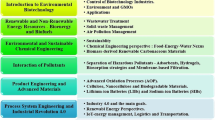Abstract
The discovery of oil peaked in the 1960s, meaning that the corresponding peak of production is now imminent. The technical evidence is compelling, but the issue is clouded by denial and obfuscation. Peak oil threatens to be a historic discontinuity as the economic growth of the past Century, which was driven by an abundant supply of cheap oil-based energy, gives way to decline. The population of the world, which grew six-fold in parallel with oil, faces decline, probably accompanied by rising migration pressures. Radical new political structures may be needed in a world facing ever deeper resource and environmental constraints.
Similar content being viewed by others
REFERENCES
Abernethy, V. D. (1993). Population Politics. New York: Plenum Press.
Abernethy, V. D. (1996a). Population theory and future population size. In B. Nath (Ed.). Environmental Pollution-ICEP3. London: European Centre for Pollution Research.
Abernethy, V. D. (1996b). Ethics, migration, and global stewardship. International Migration Review 30(1) 132-150.
Abernethy, V. D. (1997a). Defining the new American community: A slide to tribalism? In M. Dobkowski & I. Walliman (Eds.) The Coming Age of Scarcity. Syracuse, NY: Syracuse University Press.
Abernethy, V. D. (1997b). Allowing Fertility Decline: 200 Years After Malthus's Essay on Population. Environmental Law 27(4) 1097-1110, 1997.
Abernethy, V. D. (2001). Carrying capacity: the tradition and policy implications of limits. Science & Environmental Politics http://www.esep.de/articles/esep/2001/article1.pdf
Bartlett, A. A. (1998). Reflections on sustainability, population growth and the environmentrevisited; Renewable Resources Journal, Winter 1997/8.
BBC (British Broadcasting Corporation) (2000).The last oil shock: The Money Programme, Nov. 8.
Bentley, R. W. et al. (2000). Perspectives on the future of oil, Energy Exploration & Exploitation 18/2-3.
Brown, E. (2001). Argonne economist predicts gas price bump and following recession. See www.anl.gov/OPA/logos19-1/econ01.htm.
Brown L. R. (2001). Eco-economy: Building an Economy for the Earth. New York: Norton.
Campbell, C. J. (1997). The Coming Oil Crisis. Multi-Science Publishing Co. & Petroconsultants.
Campbell, C. J. (2000). Depletion and Denial: the final years of oil supplies. USA Today, Nov.
Campbell, C. J., & Laherre`re, H. H. (1998). The end of cheap oil. Scientific American (March) 80-86.
Davies, N. (1996). Europe: A History. London: BCA.
Deffeyes, K. S. (2001). Hubbert's Peak: The Impending World Oil Shortage. Princeton, NJ: Princeton University Press.
Dowthwaite, R. (1992). The Growth Illusion. Dublin: Lilliput.
Economist (2001). Oil depletion-sunset for the oil business. Nov 3rd, 97-98.
Fleming, D. (1999). The next oil shock? Prospect (April).
International Energy Agency. (1998). World Energy Outlook (1998 Edition).
Spring, C. (2001). When the Light Goes On: Understanding Energy Catalina, AZ: Emerald Resource Solutions.
USGS (United States Geological Survey) (2000). World Petroleum Assessment-Description and Results; DDS 60.
Yergin, D. (1990). The Prize. New York: Simon & Schuster.
Youngquist, W. (1997). Geodestinies: The Inevitable Control of Earth Resources over Nations and Individuals. Portland, OR: National Book Co.
Author information
Authors and Affiliations
Rights and permissions
About this article
Cite this article
Campbell, C.J. Petroleum and People. Population and Environment 24, 193–207 (2002). https://doi.org/10.1023/A:1020752205672
Issue Date:
DOI: https://doi.org/10.1023/A:1020752205672



